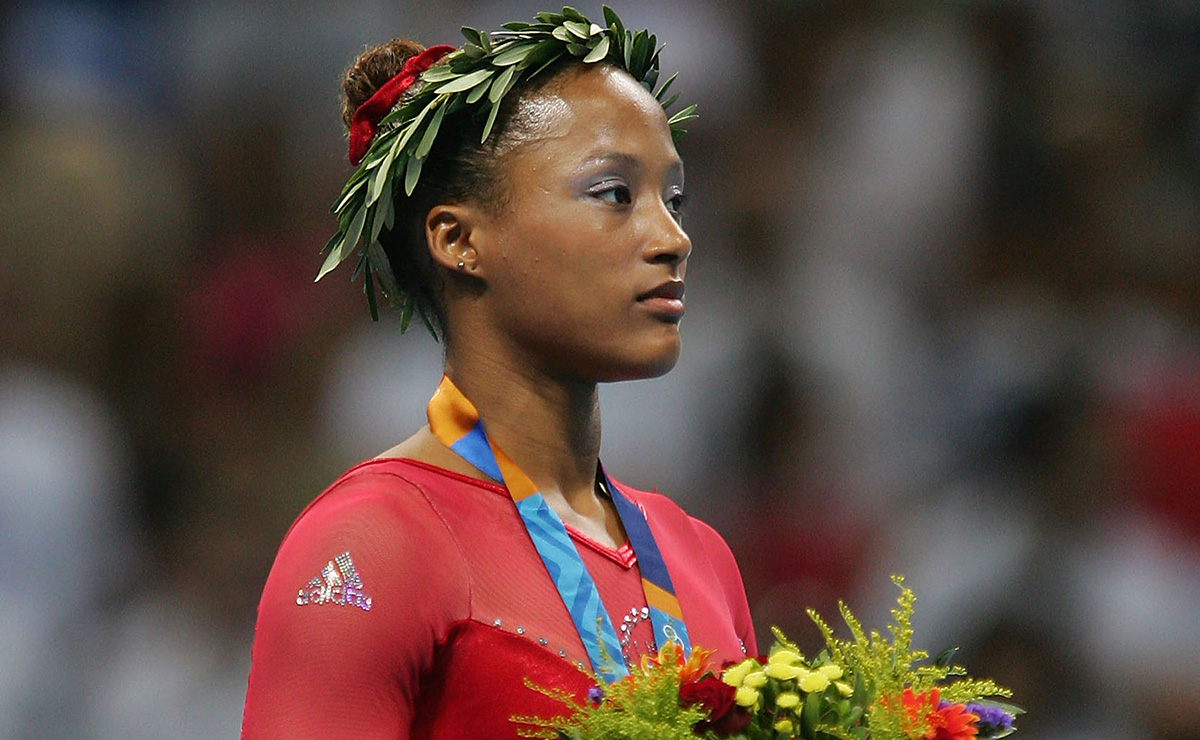Proud. Humble. Thankful. When 2022 USA Gymnastics Hall of Fame inductee Annia Hatch reflects on her storied gymnastics career and the ups, downs, twists and turns that led her to the Olympic podium in 2004 as a member of Team USA, she can’t help reciting these words again and again.
Hatch has seen her share of setbacks and disappointments. Her path to the 2004 Athens Olympic Games was far from linear, with stops and starts throughout. But Hatch, who was born in Cuba and represented her native homeland for much of her career, is not one to dwell on missed opportunities. She prefers to fill the space with positivity, an approach that served her well as an athlete and one she continues to bring to her work as a coach, judge and administrator.
“Anything I do, I try not to focus on the negative at all,” said Hatch. “[Staying positive] keeps you strong. It keeps your head up. You can have all the talent in the world, but if your mindset’s not in the right place, goals will be very hard to accomplish.”
Cuban prodigy
It’s a motto that has been put to the test throughout her life and athletic career. When she was 6 years old, Hatch was selected to attend a special boarding school in Cuba for gifted athletes, leaving behind a traditional childhood to pursue her gymnastics dreams. A sudden bout of appendicitis when she was 12 threatened more than just her sport ambitions. She found herself fighting for her life.

“It was a very hard six months,” she explained. “I was very ill. I had to relearn how to walk. I couldn’t go up and down stairs.”
Hatch’s condition slowly improved, and with great effort, she returned to form only to be confronted by another life-altering health complication – one that she continues to manage. She was diagnosed with spina bifida, a neural tube defect of the spine. After consulting with medical personnel, Hatch made the decision to continue in the sport, knowing that her core and back strength would be pivotal to her ability to safely train and compete.
Hatch became one of Cuba’s top gymnasts, earning four medals – two silver and two bronze – at the 1995 Pan American Games. In April of 1996, she became the first gymnast from a Latin American country to earn a medal at the Artistic Gymnastics World Championships when she captured bronze on vault. The performance secured her an invitation to the Atlanta Olympic Games, set to begin that July, but the Cuban federation declined to send her, citing financial limitations.
“After that, I retired,” Hatch said. “Back in the day, at a certain age, you were told gymnastics is over. [At] 16, after one cycle of the Olympics, it’s over.”
Though she believed her competitive career was finished, Hatch remained active in the sport. In 1999, she emigrated to the U.S., where she and then-husband Alan owned and operated a gymnastics club.
While a club owner, Hatch began to see former teammates and peers competing well into their 20s, challenging what she had come to accept as the conventional age limits of the sport. She suddenly saw her career in a new light.
“I didn’t feel like I was done,” she explained. “There were different athletes showing me that it was possible. I was the owner of my gym and had the facility. I said, ‘Let’s go for it.’ I was determined to have fun going back out there and doing what I love, and it happened sooner than I expected.”
After six months of training, Hatch felt her physical strength and muscle memory return. The skills were quick to follow, and in 2002, she qualified to the U.S. Classic – a competition she won – and the subsequent U.S. Gymnastics Championships, where she finished fourth in the all-around.
Hatch was back, ready to step onto the international stage under a new banner, but like the early chapters of her gymnastics career, the encore would present additional obstacles to overcome.
In spite of her U.S. citizenship and pleas from former President Jimmy Carter, Cuba did not release Hatch to compete as an American in 2002. So she waited and hoped that her time would come.
Finally, she was tapped to represent the U.S. at the 2003 World Championships. But Hatch tore her ACL in the leadup to the competition, jeopardizing her quest to make the 2004 Olympic team.
“I always took the sport one day at a time,” Hatch said. “After my knee injury, I didn’t know if I was going to be able to come back. I just told myself, ‘If it’s meant to happen, it will happen.’ I gave it my all, [believing] if it’s a good ending, it’s the icing on the cake.”
Hatch recovered just in time for the 2004 national championships. She secured top marks on vault and, at 26, was selected to represent the U.S. at the Athens Olympic Games, eight years after she was denied the chance to compete on the Olympic stage in Atlanta.
Hatch went on to claim silver medals in the team and vault competitions, becoming only the second Latina gymnast to represent the U.S. at the Olympics – as well as the second to medal – behind Tracee Talavera, who captured team silver at the Los Angeles Games in 1984.
No matter how much time passes, the achievement, and its legacy, stay with her.
“It’s a very nerve-racking experience,” she explained. “It’s the United States – one of the top countries. [Representing the Latina community] is something that’s in the back of your mind. You have to be able to take pride [and] take responsibility as well. You never get over that. Ten years later, you look back, and you say, ‘This happened, and it was me.’ It’s amazing.”
Giving back
Hatch has continued to be a visible presence and active voice in the gymnastics community since retiring after Athens. Her Hall of Fame induction in July was the latest recognition of her legacy.
“Being out there and representing, it’s very important for the new generation that comes,” she said. “They know that it doesn’t stop at being an athlete. There’s always growth – growth as a person and growth for the sport.
“I love judging and coaching – just everything. I’m here for the sport. I’m helping out those that need to know or experience in a different way what the sport can be. In a positive way. That’s important because kids get so much pressure on themselves [and from] the outside world. When I coach, I say, ‘It’s okay to make mistakes. It’s okay to not be perfect.’ [Some people] think that perfection is what the goal of the sport is. It’s not. It’s the growth, enjoyment, being able to show what you can do.”
Despite her love of coaching, Hatch takes a back seat when it comes to her 7-year-old daughter, Faith, a budding gymnast.
“Mommy is Mommy. Mommy doesn’t really know about gymnastics,” she laughed. “She loves [gymnastics]. We’ll see what happens. I don’t push. I want her to grow up and be herself. I don’t want her to feel like she has to follow in my footsteps.”
Still, Hatch knows that she is a role model to many and has some simple advice for gymnasts everywhere.
“I would tell them to believe in themselves,” she said. “Everything is possible when you believe and have that support system behind you. Try hard every day and be okay when things are not going your way. See beyond those days and know your potential.”




